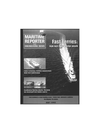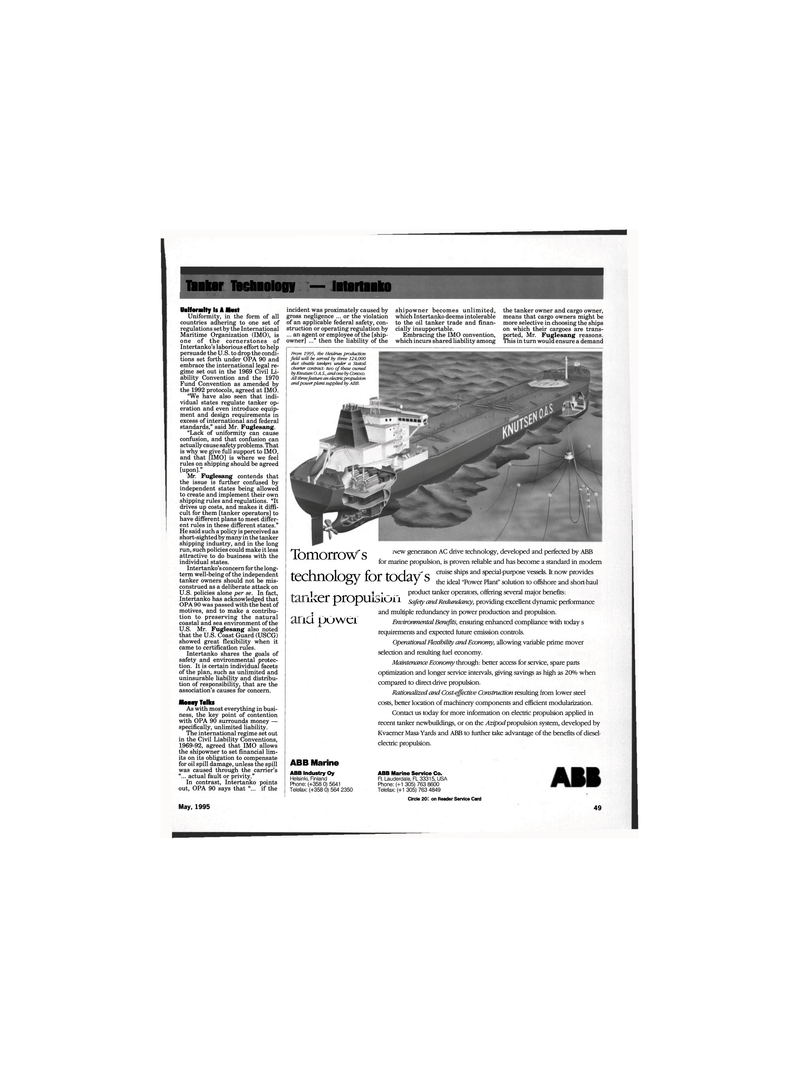
Page 47: of Maritime Reporter Magazine (May 1995)
Read this page in Pdf, Flash or Html5 edition of May 1995 Maritime Reporter Magazine
Tanker Technology — Intertanko
BHHHHHHHHHHHHHHHH
Uniformity If A Must
Uniformity, in the form of all countries adhering to one set of regulations set by the International
Maritime Organization (IMO), is one of the cornerstones of
Intertanko's laborious effort to help persuade the U.S. to drop the condi- tions set forth under OPA 90 and embrace the international legal re- gime set out in the 1969 Civil Li- ability Convention and the 1970
Fund Convention as amended by the 1992 protocols, agreed at IMO. "We have also seen that indi- vidual states regulate tanker op- eration and even introduce equip- ment and design requirements in excess of international and federal standards," said Mr. Fuglesang. "Lack of uniformity can cause confusion, and that confusion can actually cause safety problems. That is why we give full support to IMO, and that [IMO] is where we feel rules on shipping should be agreed [upon]."
Mr. Fuglesang contends that the issue is further confused by independent states being allowed to create and implement their own shipping rules and regulations. "It drives up costs, and makes it diffi- cult for them [tanker operators] to have different plans to meet differ- ent rules in these different states."
He said such a policy is perceived as short-sighted by many in the tanker shipping industry, and in the long run, such policies could make it less attractive to do business with the individual states.
Intertanko's concern for the long- term well-being of the independent tanker owners should not be mis- construed as a deliberate attack on
U.S. policies alone per se. In fact,
Intertanko has acknowledged that
OPA 90 was passed with the best of motives, and to make a contribu- tion to preserving the natural coastal and sea environment of the
U.S. Mr. Fuglesang also noted that the U.S. Coast Guard (USCG) showed great flexibility when it came to certification rules.
Intertanko shares the goals of safety and environmental protec- tion. It is certain individual facets of the plan, such as unlimited and uninsurable liability and distribu- tion of responsibility, that are the association's causes for concern.
Monay Talks
As with most everything in busi- ness, the key point of contention with OPA 90 surrounds money — specifically, unlimited liability.
The international regime set out in the Civil Liability Conventions, 1969-92, agreed that IMO allows the shipowner to set financial lim- its on its obligation to compensate for oil spill damage, unless the spill was caused through the carrier's "... actual fault or privity."
In contrast, Intertanko points out, OPA 90 says that "... if the
May, 1995 incident was proximately caused by gross negligence ... or the violation of an applicable federal safety, con- struction or operating regulation by ...an agent or employee of the [ship- owner] ..." then the liability of the shipowner becomes unlimited, which Intertanko deems intolerable to the oil tanker trade and finan- cially insupportable.
Embracing the IMO convention, which incurs shared liability among the tanker owner and cargo owner, means that cargo owners might be more selective in choosing the ships on which their cargoes are trans- ported, Mr. Fuglesang reasons.
This in turn would ensure a demand
ABB Marine
ABB Industry Oy
Helsinki, Finland
Phone: (+358 0) 5641
Telefax: (+358 0) 564 2350
ABB Marine Service Co.
Ft. Lauderdale, FL 33315, USA
Phone: (+1 305) 763 8600
Telefax: (+1 305) 763 4849
ABB
Circle 203 on Reader Service Card 49
Tomorrow S ^enerat*on ^ drive technology, developed and perfected by ABB for marine propulsion, is proven reliable and has become a standard in modem terh ri nl ncrv fnr fori a\t ^ cruise ships and special~pu,pose vessek Ic now provides
LCCiiilUIUgy 1UI luuay O the ideal "Power Plant" solution to offehore and short-haul 1 -I . product tanker operators, offering several major benefits:
IxvCl pi Up UlolUl 1 safely and Redundancy, providing excellent dynamic performance -t and multiple redundancy in power production and propulsion. lvJ- UUWCl Environmental Benefits, ensuring enhanced compliance with today s requirements and expected future emission controls.
Operational Flexibility and Economy, allowing variable prime mover selection and resulting fuel economy.
Maintenance Economy through: better access for service, spare parts optimization and longer service intervals, giving savings as high as 20% when compared to direct-drive propulsion.
Rationalized and Cost-effective Construction resulting from lower steel costs, better location of machinery components and efficient modularization.
Contact us today for more information on electric propulsion applied in recent tanker newbuildings, or on the Azipod propulsion system, developed by
Kvaerner Masa-Yards and ABB to further take advantage of the benefits of diesel- electric propulsion.
From 1995, the Heidrun production field will be served by three 124,000 dwt shuttle tankers under a Statoil charter contract: two of these owned byKnutsen O.A.S., and one by Conoco.
All threefeature an electric propulsion and power plant supplied by ABB.

 46
46

 48
48
